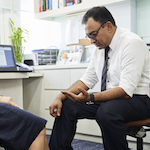DIABETIC FOOT SCREENING AND WOUND CARE

Changes in diet and lifestyle have led to an epidemic of diabetes worldwide. Type 2 diabetes (the diet lifestyle related diabetes that affects us as we grow older) is up to 6 times more common in people of South Asian descent. Studies suggest that the lifetime risk of a diabetic foot ulcer in a diabetic may be as high as 25%, and these ulcers or wounds precede amputations in about 85% of cases. Failure of the wound to heal is related largely to the poor blood flow in the legs and feet of diabetics and their inability to feel their feet well due to a loss of sensation. Sadly, almost half of those with a major amputation are unlikely to live beyond 5 years and prevention of foot ulcers is the key.
An early assessment of sensation and blood flow allows appropriate steps to be taken to prevent ulcers from occurring in the first place. Our diabetic foot screening programme allows regular assessments of loss of sensation and blood flow across the foot to be done using the hemodynamic studies at our vascular diagnostic laboratory at Gleneagles Hospital.
For those unfortunate to develop an ulcer in the legs and feet, we offer a full range of wound care services including wound debridement (removal of dead tissue in wound), management of diabetic foot ulcers, compression therapy for venous leg ulcers, high dose topical oxygen therapy (Natrox therapy) for patients with poor blood flow and low intensity ultrasonic extra-corporeal shock wave therapy (ESWT) for chronic non-healing wounds. These serve as adjuncts to the vascular treatments but are essential to assist in the rapid healing of diabetic and venous leg ulcers, prevent amputations and significantly alleviate discomfort from these conditions.
If you suffer from diabetes or have had a leg ulcer in the past or would like a regular diabetic foot screen, contact us or visit the relevant pages of this website for more information.
